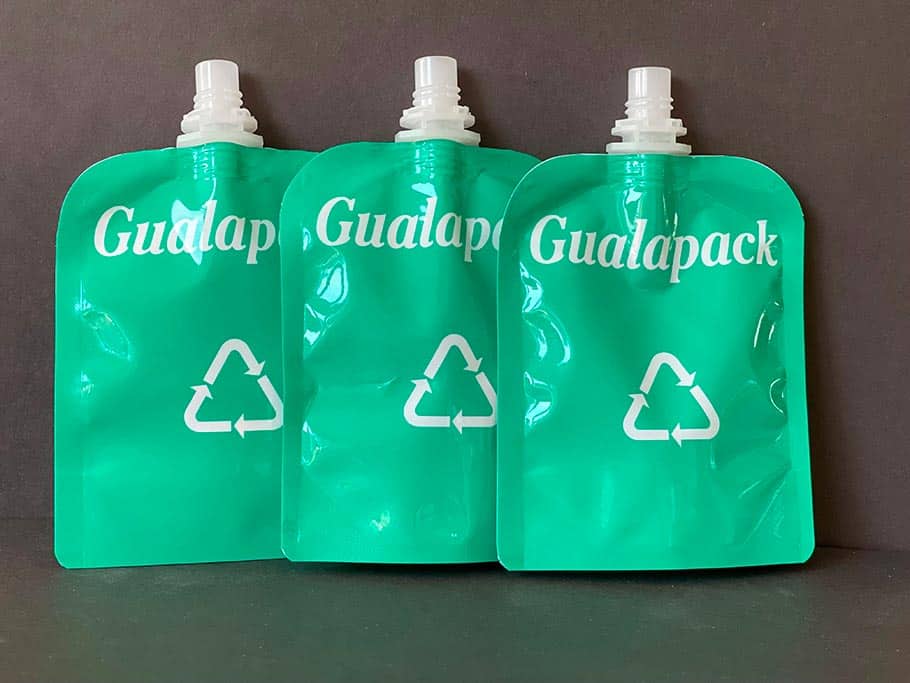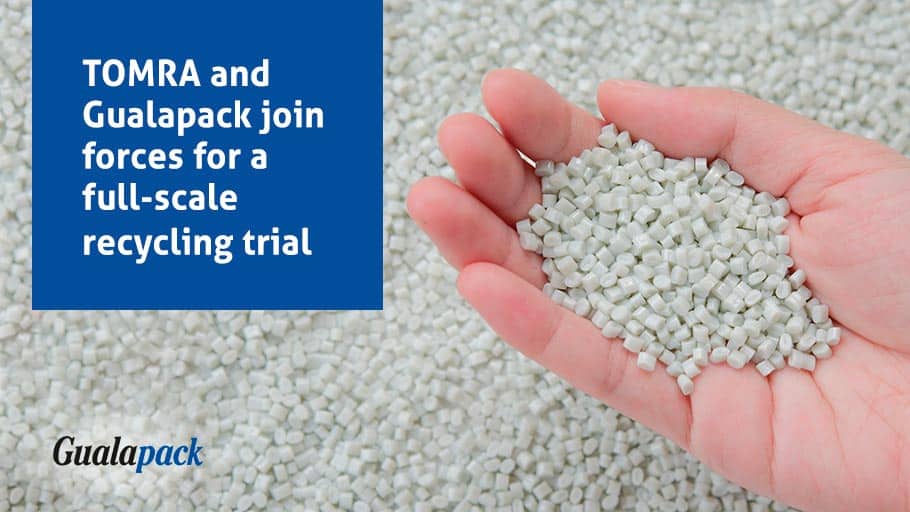TOMRA and Gualapack work together to prove the recyclability of Gualapack’s first-of-a-kind monomaterial PP spouted pouch through all stages of treatment of a DKR rigid PP waste stream.
In a context of full-scale sorting and recycling infrastructure, Gualapack’s first-ever monomaterial polypropylene spouted pouch was proven recyclable. The results of extensive testing, carried out on several sites during the course of 2020, demonstrate that sustainability through innovation is possible.
Industry leaders TOMRA and Gualapack, both members of CEFLEX (the European platform for the Circular Economy of Flexible Packaging), joined forces to test how one of Gualapack’s innovative products, which combines monomaterial laminates and semi-rigid multi-layer components, could be automatically and effectively managed for recycling in the rigid PP (polypropylene) stream.
Gualapack is the world leader in pre-made spouted pouches and a global player in the flexible packaging industry, manufacturing laminates, caps and pouches for baby food, snacks, pharmaceutical products and a wide range of other applications. The company is fully committed to sustainability, which in the past few years has been its greatest driver for growth and innovation.
Michelle Marrone, Gualapack Sustainability Manager recalls, “It was 2018 when I first met Jürgen and TOMRA. At Gualapack, we were busy tackling the challenge of designing a monomaterial spouted pouch that had to resist hot-filling, pasteurization, and maintain its barrier properties 12 months on the shelf. But at the same time, I knew that to be monomaterial by design was not enough! It was equally important to prove our circularity by demonstrating that our pouch could be correctly identified as PP, sorted, processed and extruded on an industrial line.”
As a passionate and trusted innovation leader with 50 years of experience in circular waste management, TOMRA provides technology-led solutions and contributes proven expertise, established processes and market knowledge, which enable Circular Economy solutions through advanced collection and sorting systems.
“After development of the new pouches, and to determine whether these could be sorted with optical sorters, we added a significant amount of them to a combined separate source and mixed waste stream sorting plant for automated sorting,” explained Jürgen Priesters, SVP Business Development TOMRA Circular Economy. “The result was very good detection and accurate separation rate of all pouches. A subsequent washing and recycling trial showed that the Gualapack mono-material pouches could be easily recycled into standard products.”
As a first step, different percentages of Gualapack pouches were added to rigid PP waste, which was then processed through TOMRA’s AUTOSORT®, a sensor-based sorting machine that confirmed pouches are well identified as a PP material, with over 80% redirected to the rigid PP stream. Then, a waste PP bale with 5% additional pouches and a bale without any pouches were compared, in a back-to-back trial that took them through all the steps of a standard recycling process. First shredded into flakes and hot washed with water and sodium hydroxide at 85 °C (185 °F), then post-sorted through a second AUTOSORT FLAKE machine to further improve the quality of the material, the two bales were then extruded on an industrial scale extruder and pelletized back to PP.
Results were surprisingly good, with ink and adhesives from the pouches not impacting on extrusion, and affording high thermal stability without any odor or volatile issues. Furthermore, the pelletized materials were characterised by third party laboratories and declared comparable to PP copolymer grades suitable for injection moulding.
This key takeaway demonstrates that the Gualapack monomaterial pouches are well tolerated within a German DKR rigid PP stream and that TOMRA sorting systems, in real-life scenarios, are suitable infrastructure to correctly identify and sort monomaterial laminates, even in the presence of semi-rigid multi-layer structures. Furthermore this is a successful example of design for recyclable packaging according to the CEFLEX D4ACE (design for a circular economy) guidelines.

Packaging 360 is a comprehensive knowledge sharing ecosystem for the Indian packaging industry. Our services include an online content platform to deliver news, insights and case studies; organising conferences seminars and customised training; Providing Bespoke Project Consulting, Market Research and Intelligence.







